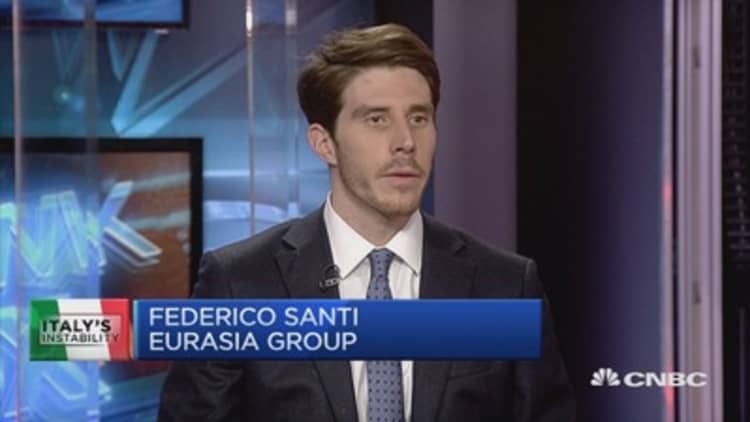Italy might have just become a smaller concern for investors after the constitutional court ruled on changes to the country's electoral law.
Analysts believe that a court ruling, published Wednesday, will make the Italian electoral system more proportionate and thus, less likely, to give room for a government led by the populist and anti-euro Five Star Movement (M5S).
"Even if the anti-Euro M5S emerges as the largest party in the next elections, it will not obtain a parliamentary majority given the strongly proportional system," Wolfango Piccoli, co-President of Teneo Intelligence, said in a note.
"As a result, the M5S would be able to take over power only if it strikes a coalition deal with other parties. This is a near-impossible task for M5S given its intransigence in dealing with other political forces in order to preserve its 'anti-establishment' identity," Piccoli added.
Italy is being governed by an interim executive since the resignation of former prime minister Matteo Renzi.
President Sergio Matarella wants the electoral law approved before calling for new elections.
Like in other European countries, support for anti-euro movements has risen since the 2008 financial crisis – something that investors interpret as a worry when looking at opportunities in Italy.
But the increased proportionality in the Italian system makes it now harder for populists to take over the next government.

"It is worth noting also that the decision to abandon the second ballot-runoff system reduces the likelihood that anti-establishment (single) parties may be able to win an outright majority," Fabio Fois, economist at Barclays, said in a note.
The Five Star Movement does not want to be associated with mainstream parties and these do not want to work with it either.
Thus, if the Five Star Movement were to win the upcoming election, the other parties would form an anti-populist coalition.
"The result would be an unstable and unwieldy coalition between the center-left led by Renzi's Democratic Party (PD) and the center-right. Depending on the parliamentary arithmetic, the PD could be forced to seek Silvio Berlusconi's support to be able to form a government – a development that in the long run could further boost the support for anti-establishment forces such as M5S," Piccoli of Teneo said.
Following Wednesday's vote on electoral law, analysts believe that Italy could hold snap elections before the summer.
"(The) Constitutional Court ruling makes snap elections in the second quarter of 2017 more likely," Fois from Barclays said.
"Early elections should be considered a positive development… If a pro-reform coalition were to emerge from the snap elections in June, it would help to jump-start the reform agenda sooner (possibly before year-end) – almost a year earlier than the alternative of waiting for elections to be held at the end of the legislature ( in 2018)," he added.


